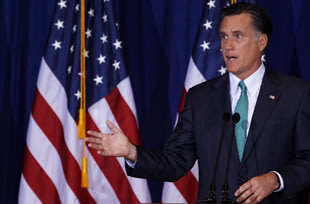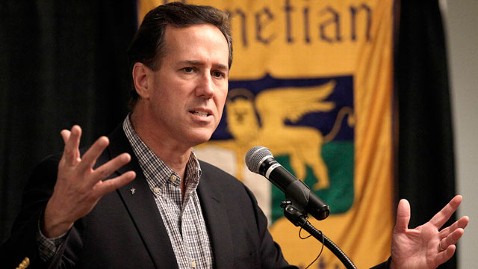2012 southern primaries today

Gingrich in Alabama
The big political ticket today is two southern primaries, in Alabama and Mississippi—Hawaii and American Samoa have caucuses today, too, but that’s a different story, and anyway, the delegates from beautiful places at remote distances are mainly being commandeered by Mitt Romney.
A competent run-down on the probabilities here
All the discussion serves as a reminder of how many kinds of political analysis there are, even in the respectable spectrum of public discourse, and even aside from political differences among the analysts.
Questions on several levels:
The open-scandal question in Alabama and Mississippi is how well Newt Gingrich’s race-baiting, politely referred to as ‘dog whistle’ or code, will work for him—will it be enough to pull him ahead of Romney?
The more conventional question is simply who will win in each state primary, and by how much, leading to the delegates question.
The less plumbed question of delegate math is the big one–whether Gingrich and Rick Santorum will pull away enough votes from Romney to siphon off the delegate count significantly. Since each state has its own version of this cycle’s super delegates, softening the proportionality of proportional representation, that question is less easy to figure—even after the results. But the question bears on the GOP convention in Tampa. Any figure less than 1144, as we know, means that Romney will go to the convention without the nomination sewn up, theoretically. It’s a little hard at this point to imagine anyone else the nominee, especially if Romney goes in with around or near 1100 delegates beforehand, but on paper the nomination would still remain to be determined at the national convention.
Nice billboard for Tampa, when the time comes:

Romney in an earlier campaign
That would make it one of the more interesting GOP conventions in decades, since the 1968 Republican National Convention in Miami—written up by Norman Mailer among others—or since the decades when Mississippi Republicans routinely sent two rival delegations to the national convention. The Lily Whites—that was their name for themselves, as was the Black and Tans for the rival delegates—always won.
Side note:
I continue to think that Romney is being put through the wringer way too hard over his harmless comments about grits. The commentators are making him look good by comparison, as do Gingrich and Santorum. These are ethical matters. It is ethically flawed to ignore an ethical problem, wrongdoing, when it occurs, such as the fact that the date of Jose Padilla’s arrest in Chicago is still classified information. Our U.S. Marshals could have told the public a lot about torture under the previous administration, if the GOP in Congress had not prevented it. After all, it’s the Marshals who transport prisoners, inmates and ‘detainees’ and who thus have occasion to observe their condition.
Conversely, though, it is also ethically flawed to elevate some little thing into an accusation of wrongdoing when it isn’t one. Eating the local food and saying nice things about it does not qualify as something to rake a candidate over the coals for.
It would be much more substantive to try to get the GOPers to address Wall Street bonuses and other executive compensation after the mortgage-derivatives debacle, or vote suppression, or speculating on oil futures, or the effect of fear-mongering and saber-rattling on the price of oil, or the fact that insurance premiums (rates) go up every year, etc., etc.
more later
[update]
Speaking of GOP Deep-South primaries and other Limbaugh fans–
Think Progress reports that at least 140 sponsors have pulled out of Limbaugh’s show. This from the corporate horse’s mouth itself.
[update]
It’s twilight on a beautiful spring day in the mid-Atlantic. Polls in Alabama and Mississippi will close in less than an hour. That Romney, Gingrich and Santorum have been polling close to each other messes up the narratives. Anyone who wants to talk in terms of ‘narrative’ has to offer a smorgasbord.
A few interesting items gleaned from the coverage, although not necessarily new:
- Chris Matthews is claiming, as ever, that Mitt Romney is “a moderate”
- Dan Balz of the Washington Post is intent, as ever, on the thesis that the November general election will be a nail-biter–Balz characterized the 2008 election as “almost ideal conditions” for Obama
- CBS News is declaring flatly that Alabama and Mississippi are make-or-break for Newt Gingrich. CBS declares that Gingrich has to win there, or he will face immense pressure to drop out; no word about delegates awarded proportionately
- little word on the major networks about vote suppression efforts
- the phrase “brokered convention,” re Tampa, has been replaced, possibly temporarily, with the phrase “open convention”
Time will tell.
Polls closed–8:16 p.m.
According to CNN’s exit polls, Romney looks to win in Mississippi–he should, with all the ads–and Santorum in Alabama, where the Republican guv weighed in thoughtfully mentioning that Romney’s Mormonism might be a “subtle” factor there and elsewhere. CNN exit polls also give Romney the edge among large groups such as married women.
Much emphasis also on the president’s apparent drop in opinion polls among women, in the past month. Bound to happen with the cable channels and others touting birth control as a ‘woman’ issue. Birth control is not a women’s issue. It is a population issue, thus a matter of economy as well as of choice.
Back to the results–at least as suggested in exit polls–CNN and MSNBC are joining CBS in talking up big how Newt Gingrich should drop out if he doesn’t win tonight. So there’s your heavy pressure, right there. Presumably Fox News feels the same way. No mention of proportional delegates, mainly, in this context.
One would like to hope that it’s because Gingrich’s ‘southern strategy’ has embarrassed the media outlets. One would like to, but one can’t.
8:49 p.m.
Earliest exit polls trimmed back slightly, at least as regards Romney’s lead.
Could a virtual three-way tie be shaping up? Or will Newt Gingrich please a growing chorus of commentators and come in decisively third in both these Deep South states? No one is talking about Gingrich in Louisiana and Texas, right now.
9:32 p.m.
At the moment, things not going according to plan. With voices on all the channels speculating about how soon Newt Gingrich will/should drop out, Mitt Romney is the man stubbornly clinging to third place in both Mississippi and Alabama. It’s early days yet, and the three-way race in each state is by far too close to call, or even to make an educated guess about. But with 37 percent of the vote back in Mississippi and 6 percent in Alabama, which is moving returns much slower, Romney remains behind both Santorum and Gingrich.
Meanwhile, on CNN panelist Ari Fleischer, aka Mouth of Sauron–who helped us into the Iraq war as GWBush’s press secretary–is insisting that Newt Gingrich will in all probability drop out of the race in two days. That is, if Gingrich does not win tonight. Fleischer sets the bar pretty high for Gingrich. According to him, Gingrich has to carry both states to declare this evening a win, and anything else–he’s out. “You have to win.”
10:04 p.m.
The lineup the same in both Mississippi and Alabama, with 79 percent and 34 percent of the vote in, respectively–Santorum first, Gingrich second, Romney third. NBC has already called Alabama for Santorum, who leads by four or five percent rather than by one or two as in Mississippi. Mississippi is still designated too close to call.
Another guest on MSNBC joins the chorus of voices encouraging Gingrich to get out–former John McCain strategist Steve Schmidt, now extra well known after the HBO movie Game Change. With Gingrich clearly ahead of Romney (the front-runner) in both states, obviously the argument has changed. That is, the rationale for urging Gingrich to get out can no longer be that that’s the only way Romney can be beat.
So, as one might surmise, all those media voices urging other candidates to ‘coalesce’ around an anti-Romney candidate were never about finding the most genuine conservative.
Q.E.D.
10:57 p.m.
Santorum, speaking from Louisiana, blames Louisiana’s difficulties on Obama and on environmentalism. Typical faux populism, targeting rural voters again. Nothing from him about the dredging and drilling that have frayed the Gulf Coast, opening the way for devastation by hurricanes by removing every protection from nature. Nothing about the enormous tax give-aways for Big Oil, just another claim that environmental regulation–like keeping the Gulf of Mexico from becoming one big oil pool–is destroying jobs and raising gas prices. Nothing about speculation on oil futures, of course.
By such means, combined with record low turnout, he did win Mississippi as well as Alabama. Gingrich second in both, Romney third in both.
The contest was not between one moderate and two conservatives, with the two latter splitting the field.
The contest in Mississippi and Alabama was between the rural-area vote and the metro-area vote, with Gingrich and Romney splitting the latter. The latter is disproportionately small in both states.
No wonder Santorum is talking from Louisiana, about heading to Missouri. No wonder the most prominent media figures are feverishly boosting the GOP establishment tonight, calling on Gingrich to step aside before all the precincts are in. The vague argument seems to be that that gives Santorum a clear shot at Romney. I doubt it. As things look now, Santorum would get buried in a one-on-one progression even if he picked up Louisiana and Missouri. Our population centers contain most of our population. A pretty sad prospect of a race, looking to be even uglier without Gingrich than with him. But disappointingly, too many of the journalists, even, seem eager to forestall an open convention in Tampa.
Meanwhile, the three candidates still pretty much split the MS and AL delegates three ways, of course, with Romney to sew up some more in the island caucuses.































